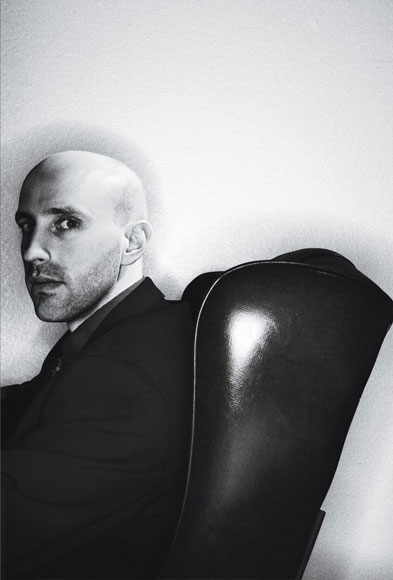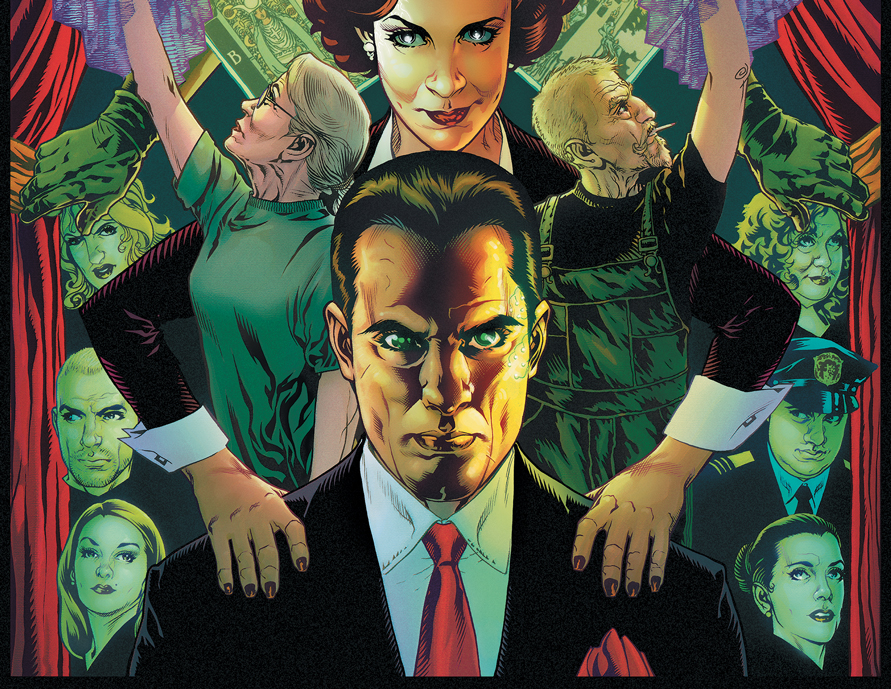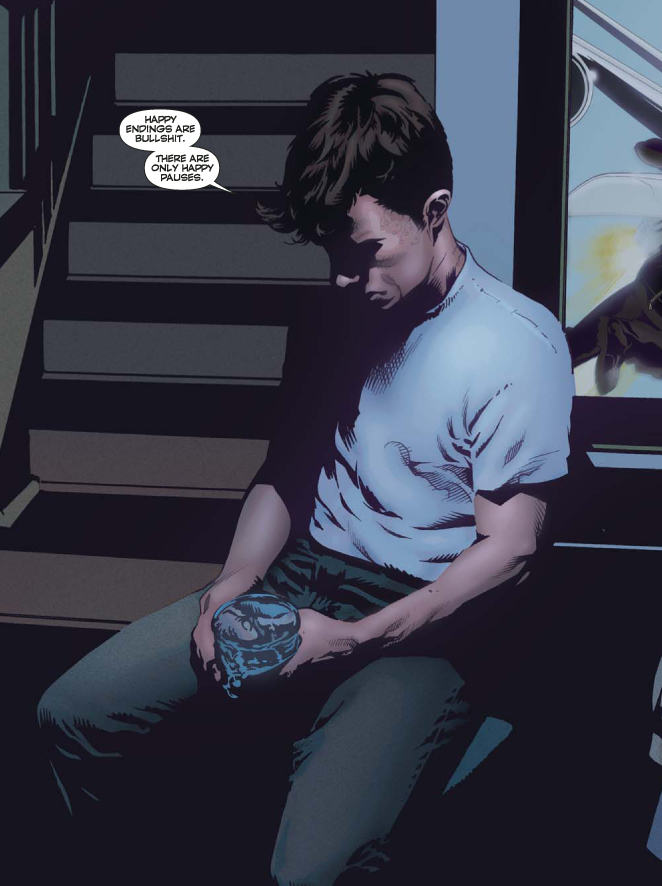 Brian K. Vaughan is among a select number of creators who have been able to establish and maintain a significant fan following based primarily on their creator-owned work. Although he is also known for his work on Marvel's Runaways, his main focus has been on his own properties, where he is able to create worlds and shape the direction of them, as in his 2002-2008 Y The Last Man series, and currently in Ex Machina, which concludes with issue #50 this Wednesday. I spoke with Brian about the end of the series that has made such an impact, and what's next for him.
Brian K. Vaughan is among a select number of creators who have been able to establish and maintain a significant fan following based primarily on their creator-owned work. Although he is also known for his work on Marvel's Runaways, his main focus has been on his own properties, where he is able to create worlds and shape the direction of them, as in his 2002-2008 Y The Last Man series, and currently in Ex Machina, which concludes with issue #50 this Wednesday. I spoke with Brian about the end of the series that has made such an impact, and what's next for him.
Matt Adler: You've been with Ex Machina for 6 years now; how do you feel about it coming to an end?
Brian K. Vaughan: I'm mostly relieved that our little creator-owned book survived all the way to the ending we promised back in the first scene of our first issue, and grateful to the readers who made that possible. I'm sure the depression will kick in when I realize I no longer get to spend every month working with Tony, J.D., Jared, Ben, and Kristy, all of whom have been with the book since day one.
MA: The series is known primarily for two things; it's examination of US politics (particularly of NYC) and the elements of science fiction woven in throughout the stories. When you first came up with the idea for the series, did you start with one of those aspects, and then decide to work in the other, or were they always together for you?
BKV: Yeah, it was always a package deal. After 9/11, I knew I wanted to write about power and identity and the way Americans often mythologize our leaders, which are all themes that the superhero genre can handle particularly well. Plus, jetpacks and rayguns make everything awesomer, even debates about school vouchers.
MA: Can you tell us a bit about what having Tony Harris as co-creator has meant for this book?
BKV: The series would have lasted three issues without Tony. And those three issues probably would have sucked. Tony made the supernatural parts of the book feel grounded and real, and the dense political stuff feel kinetic and fun. And the fact that he pencilled (and later inked!) all fifty issues of our regular series by himself is still totally unbelievable to me.
 MA: You're also known for Y The Last Man which, like Ex Machina, followed the adventures of an individual who is set apart from everyone else in the world by happenstance, and finds himself forced to confront society's problems. Is there something about that set-up that particularly appeals to you?
MA: You're also known for Y The Last Man which, like Ex Machina, followed the adventures of an individual who is set apart from everyone else in the world by happenstance, and finds himself forced to confront society's problems. Is there something about that set-up that particularly appeals to you?
BKV: Hm, maybe? But really, I wanted to do the opposite of Y's globetrotting coming-of-age story, which is why I pitched Ex Machina as a tragedy that unfolds across just a few city blocks, featuring a protagonist who was maybe devolving more than he was ever evolving.
MA: Both series were also finite; is that a general preference for you?
BKV: Depends on the story, I guess. I always hoped characters like The Hood and Runaways would continue indefinitely, eventually growing and changing with other creators. But for my creator-owned work, yeah, I usually like to go into those series knowing exactly how and when everything is going to end.
MA: One of the key jump-off points for this book were the events of 9/11, and how they shaped events in subsequent years. Has your view of those years changed as you've gotten further away from them? Did you wind up taking the book in a different direction than you'd originally intended?
events in subsequent years. Has your view of those years changed as you've gotten further away from them? Did you wind up taking the book in a different direction than you'd originally intended?
BKV: My politics have changed a lot over the years, but the story for Ex Machina really hasn't. For good or bad, I've always felt loyal to the younger me who first pitched Ex Machina, so I decided to end the book exactly the way he (we?) intended when I first pitched the idea to Jim Lee way back in 2002.
MA: Given the book's non-linear nature, how did you keep track of the various events in Mitch's life over his 4 years in office (as well as the flashbacks that preceded his term)? Did you have a timeline mapped out from the start?
BKV: I had a weirdly detailed outline that covered all of the Great Machine's career and most of the major highlights of Mayor Hundred's term, but Tony and I left ourselves some wiggle room to take strange detours or to incorporate unexpected real-world events.
MA: Do you see Mitchell Hundred as an idealized political figure? He often seems capable of a degree of rational, level-headed analysis that's far beyond what most politicians appear to be capable of in our world.
BKV: The final issue answers that question pretty definitively, I hope.
MA: What would you say is Mitch's biggest flaw?
BKV: I don't think Hundred has one big Aristotle-style tragic flaw, just a crushing amount of smaller weaknesses that have been piling since well before he threatened to shut off a political opponent's pacemaker in our first issue.
MA: One of Mitch's defining characteristics, which seems to have been instilled by his mother (and reinforced by Kremlin) is the notion of civic responsibility, that he's obligated to get involved and try to make his corner of the world a better place. Is that something that's personally important to you?
BKV: Well, like most people, I think everyone should be civically responsible… as long as they agree with my view of what makes the world a better place. Frederic Wertham probably thought he was being civically responsible, but maybe he just should have stayed home and watched television instead.
MA: We've been told that the parallel dimension Mitch's powers come from is populated by beings who abused their world to the point of continually having to seek out others to exploit. Is that the flipside of the civic responsibility argument? A world with total disregard for the environment and its inhabitants, even their own?
BKV: But again, like most invading forces, I'm sure those people persuaded their constituents that they were acting in the best interest of "civil society." Words are dangerous.
MA: There's also the superhero aspect of the book, which ties in with the notion of civic responsibility, but Mitchell has mostly given it up in favor of helping in more real-world ways. Is there a connection you wanted readers to make, that the comic fan's love for superheroes is reflective of a deeper desire to help people, and that there are ways to fulfill that desire in the real world?
BKV: That's an excellent question, but I think I'll let the series speak for itself in that regard. I will say that it's been crazy to watch comic books and real-world politics converge over the last few years, culminating with the election of a President who grew up reading superhero comics before he ended up on the covers of them.

MA: The last few issues seemed to give some level of closure to Mitch's struggles with the aforementioned dimension. Obviously you can't give away much about the final issue, but is there still more to learn about that place, or will you be focusing more on Mitch's role within the city?
BKV: Both! Tony and I really wanted to leave everything on the field, so we asked Wildstorm for a 48-page finale, which they were cool enough to give us. We knew this was the last time in our lives we'd ever write or draw these characters, so Tony and I really obsessed over this one. Thanks so much to all the hardcore monthly readers who were patient with us here in the homestretch. I hope it was worth the wait.
MA: With Ex Machina ending, many fans are wondering where they'll go for more of your work. Do you have anything planned in comics at the moment, even if you can't say what just yet? What about other media?
BKV: Yes, new stuff in the works for film, tv, and especially comics! I'm not hiding, just plotting in secret. Like Blofeld.
Matt Adler pleads with our president to heed this cautionary tale, and resist the urge to don cape and cowl.


"BKV: Yes, new stuff in the works for film, tv, and especially comics! I’m not hiding, just plotting in secret."
Man, it does my heart good to hear that.
I got to the the party on Ex Machina way late. I’m really enjoying it in hardcovers
Hmm, guess I have to catch up on the past year or so of this before Wednesday.
Also, would any kindly fan with the issue on hand explain what happened in the first scene of the first issue? I want no part of finding mine, and I don’t think it counts as a spoiler in the thread if it’s from 49 issues ago in a thread about the series ending.
Issue 1 has Hundred in a room, making some kind of confession to an unseen individual, talking about how everything went wrong. (Or something close to that, I’m going from memory).
Basically, yeah. He mentions that people blame him for events like Bush in a flight suit on the aircraft carrier and Schwarzenegger winning governor of California (presumably because they felt he launched the trend of the politician-as-superhero), but he says these things would have happened without him, because after 9/11, people were looking for heroes.
He goes on to say "This is the story of my four years in office, from 2002 through God-forsaken 2005. It may look like a comic, but it’s really a tragedy." Kind of fourth-wall busting, but it’s possible he’s talking to another character. So with #50, it looks like we’re going to find out what makes it a tragedy, and what his role in that tragedy was.
I’m hoping it’s Angotti he’s confessing to, but who knows.
And commenting again in case that reads as a spoiler on the main page.
It’d kinda be a nice irony if he was confessing to a machine.
"Now, tape recorder, forget I said anything."
I liked this series, and was following it in trade. Somewhere along the line, I lost interest because I don’t own the trades anymore. It probably was when the delays started and the trades took a while to come out. I do own the issue where Brian pitches a Great Machine comic to Mitchell. That was a great issue.